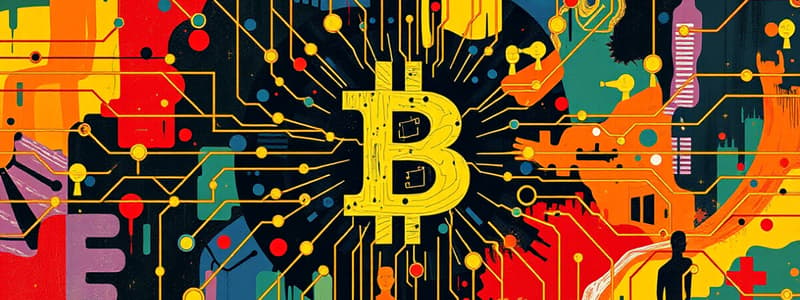Podcast
Questions and Answers
Each block contains a copy of the data stored in the ______
Each block contains a copy of the data stored in the ______
blockchain
A ______ is like your bank account number, shared with others to receive funds.
A ______ is like your bank account number, shared with others to receive funds.
public key
The ______ is a secret key that you should never share, used to sign transactions.
The ______ is a secret key that you should never share, used to sign transactions.
private key
______ are self-executing contracts with the terms of the agreement directly written into code.
______ are self-executing contracts with the terms of the agreement directly written into code.
Cryptocurrency is often stored in a ______ which allows users to manage their digital assets.
Cryptocurrency is often stored in a ______ which allows users to manage their digital assets.
Each node in the blockchain network is responsible for _____ the data.
Each node in the blockchain network is responsible for _____ the data.
Smart contracts are executed based on the _____ conditions that are coded into them.
Smart contracts are executed based on the _____ conditions that are coded into them.
In a decentralized finance system, traditional _____ are replaced by blockchain technology.
In a decentralized finance system, traditional _____ are replaced by blockchain technology.
Non-fungible tokens (NFTs) are unique digital items verified using _____ technology.
Non-fungible tokens (NFTs) are unique digital items verified using _____ technology.
A blockchain can enhance transparency in _____ systems by providing immutable records of transactions.
A blockchain can enhance transparency in _____ systems by providing immutable records of transactions.
Flashcards are hidden until you start studying
Study Notes
Blockchain Technology Overview
- Blockchain technology is rapidly evolving, shaping the future of many sectors.
- It operates on core principles ensuring transparency, security, and decentralization.
Blockchain Architecture
- Each block in the blockchain contains a complete copy of the data stored across the network.
- Data is hashed using cryptographic algorithms to ensure security.
- Hashes can only be decrypted using cryptographic keys: public and private keys.
Cryptographic Keys
- Public Key: Similar to a bank account number; it is shared publicly to receive funds. Generated from the private key to create a blockchain address.
- Private Key: Similar to the key to a safe; it remains confidential and is known only to the owner. Used to sign transactions, verifying ownership of the associated funds.
Nodes
- Nodes are individual devices participating in the blockchain network, storing data and validating transactions.
Smart Contracts
- Smart contracts are self-executing contracts with the terms directly written into code, facilitating automatic agreements and transactions without intermediaries.
Cryptocurrency
- Digital or virtual currency utilizing cryptography for security and operating on blockchain technology, enabling peer-to-peer transactions.
Crypto Wallet
- A digital wallet that allows users to store, send, and receive cryptocurrencies securely.
Supply Chain Management
- Blockchain technology enhances supply chain transparency and efficiency by providing a tamper-proof record of transactions.
Decentralized Finance (DeFi)
- A financial system that operates without central authority, using blockchain to create open-source financial services such as lending and trading.
Non-Fungible Tokens (NFT)
- Unique digital assets verified using blockchain, representing ownership of specific items, artworks, or collectibles.
Voting Systems
- Blockchain can enhance voting transparency and security, providing a trustworthy system for electoral processes.
Real Estate Systems
- Blockchain technology can streamline real estate transactions by maintaining transparent records and reducing fraud risk.
Blockchain Technology Overview
- Blockchain technology is rapidly evolving, shaping the future of many sectors.
- It operates on core principles ensuring transparency, security, and decentralization.
Blockchain Architecture
- Each block in the blockchain contains a complete copy of the data stored across the network.
- Data is hashed using cryptographic algorithms to ensure security.
- Hashes can only be decrypted using cryptographic keys: public and private keys.
Cryptographic Keys
- Public Key: Similar to a bank account number; it is shared publicly to receive funds. Generated from the private key to create a blockchain address.
- Private Key: Similar to the key to a safe; it remains confidential and is known only to the owner. Used to sign transactions, verifying ownership of the associated funds.
Nodes
- Nodes are individual devices participating in the blockchain network, storing data and validating transactions.
Smart Contracts
- Smart contracts are self-executing contracts with the terms directly written into code, facilitating automatic agreements and transactions without intermediaries.
Cryptocurrency
- Digital or virtual currency utilizing cryptography for security and operating on blockchain technology, enabling peer-to-peer transactions.
Crypto Wallet
- A digital wallet that allows users to store, send, and receive cryptocurrencies securely.
Supply Chain Management
- Blockchain technology enhances supply chain transparency and efficiency by providing a tamper-proof record of transactions.
Decentralized Finance (DeFi)
- A financial system that operates without central authority, using blockchain to create open-source financial services such as lending and trading.
Non-Fungible Tokens (NFT)
- Unique digital assets verified using blockchain, representing ownership of specific items, artworks, or collectibles.
Voting Systems
- Blockchain can enhance voting transparency and security, providing a trustworthy system for electoral processes.
Real Estate Systems
- Blockchain technology can streamline real estate transactions by maintaining transparent records and reducing fraud risk.
Studying That Suits You
Use AI to generate personalized quizzes and flashcards to suit your learning preferences.




